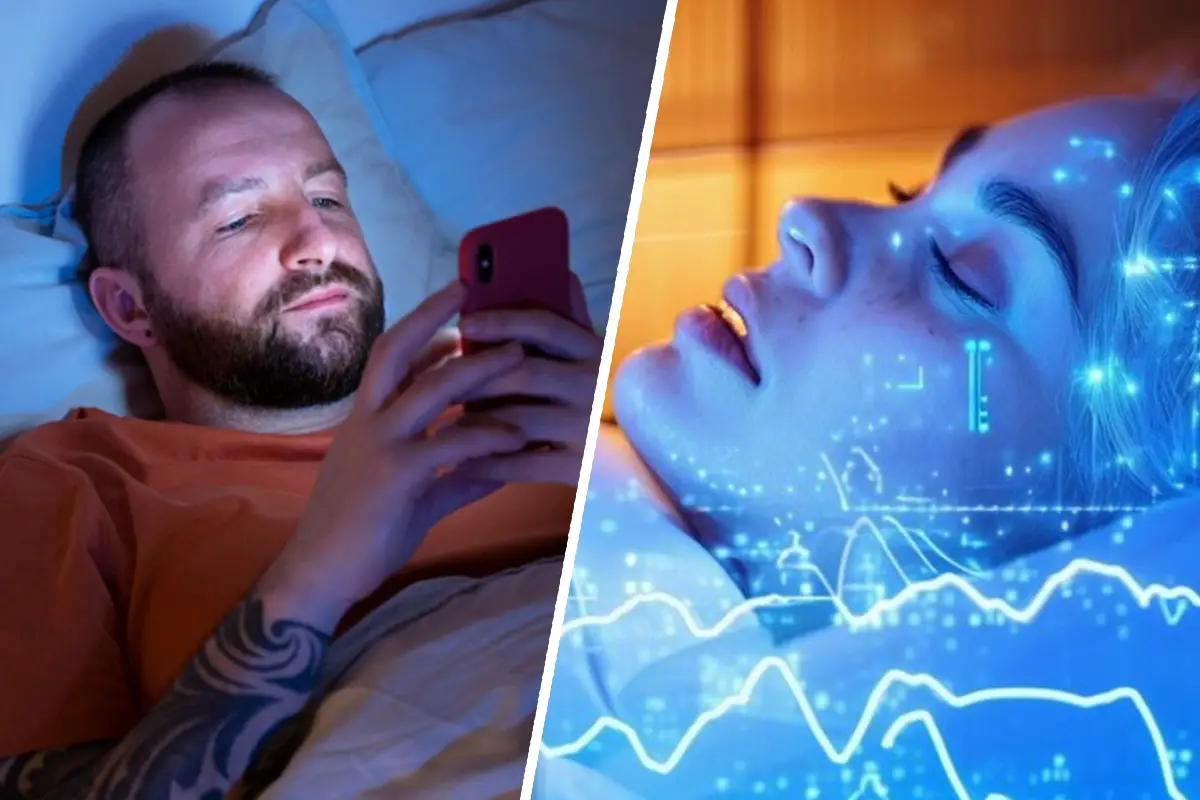The Impact of Screen Time on Sleep Quality and How to Reduce It

Impact on Melatonin Production
Evening screen time significantly affects your sleep by interfering with melatonin production. This hormone controls your sleep-wake cycle, and disrupting its production disrupts your sleep.
Your body has a natural rhythm dictating when you should be awake or asleep. In the morning, cortisol is released as the sun rises, making you alert. As daylight fades, melatonin starts to flow, making you feel sleepy. This system works well until blue light comes into play.
Blue light has shorter wavelengths than other colors in the visible light spectrum. It tricks your brain into thinking it’s still daytime, reducing melatonin production. This explains why you feel awake after browsing social media or watching TV late at night.
When melatonin production drops, your sleep quality suffers. You’re less likely to get the deep, restorative sleep your body needs, with a reduction in slow-wave and REM sleep, both critical for cognitive functions like memory and problem-solving.
Children are particularly affected by screen time, which can lead to increased sleep latency—the time it takes to fall asleep. Studies suggest screens could delay bedtime by about 10 minutes, which can accumulate to substantial sleep deprivation over time.
Bright bedroom lighting can also be problematic, cutting down melatonin production by up to 90 minutes compared to dim lighting. While ‘blue blocker’ glasses or dim light settings on devices can help, they aren’t foolproof.
To improve sleep quality, consider reducing screen time before bed and opting for activities that don’t emit blue light, like reading a physical book under dim light.

Delayed Sleep Onset and Increased Sleep Latency
Screen activities before bed are inherently stimulating, increasing alertness when you should be winding down. Whether you’re watching videos, playing games, or checking social media, these activities get your brain buzzing, making it harder to transition into a state of relaxation and sleep.
Research consistently finds that higher engagement with screen activities before bed can lead to delayed sleep onset and increased sleep latency. On average, screen time before bed can extend sleep latency by several minutes, which compounds over time, contributing to sleep debt and affecting overall sleep quality.
The ‘reward system’ triggered by screen activities also plays a role. Each notification or achievement provides a burst of dopamine, conditioning your brain to seek more stimulation. This craving for interaction keeps your brain active, fighting against the natural hormones that should be preparing you for sleep.
Tips to mitigate screen-induced sleep delay:
- Create a buffer period between screen activities and bedtime
- Set a technology curfew—aim to stop using electronic devices at least an hour before you plan to sleep
- Engage in relaxing, screen-free activities like reading a book under soft warm light
- Practice mindfulness exercises to lower your alertness
By implementing these strategies, you can make it easier for your mind and body to drift into sleep, counteracting the stimulating effects of screen time.

Reduced REM Sleep and Sleep Efficiency
Screen time before bed impacts both the quantity and quality of your sleep, particularly affecting REM (Rapid Eye Movement) sleep and overall sleep efficiency.
REM sleep is crucial for cognitive functions such as memory consolidation, learning, and problem-solving. Exposure to blue light from screens suppresses melatonin production, disrupting your sleep architecture. Studies show that individuals who engage with screens before bedtime experience a reduction in REM sleep, which can lead to cognitive impairments and decreased emotional resilience.
Screen-related activities also fragment REM sleep, diminishing its restorative benefits. These interruptions can have long-term effects, contributing to issues such as:
- Depression
- Anxiety
- Decreased ability to concentrate
Sleep efficiency, the ratio of time spent actually sleeping to the total time in bed, is also negatively impacted by screen use. If you’ve been engaging with your phone or tablet prior to falling asleep, you’re more likely to experience fragmented sleep and wake up more frequently throughout the night. This not only shortens the total sleep duration but also lowers sleep efficiency, meaning that even if you’re spending enough time in bed, the sleep you’re getting is less restorative.
To improve both REM sleep and sleep efficiency:
- Establish a nighttime routine that prioritizes relaxation and winding down
- Keep electronic devices out of the bedroom entirely
- If devices must be present, ensure they’re set to a “night mode” that reduces blue light emission
Psychological and Behavioral Effects
Screen time before bed has significant psychological and behavioral effects that extend beyond just sleep quality. The content you consume and the way you interact with screens can lead to emotional and cognitive disruptions that affect your overall mental health.
Brain Overstimulation: Engaging with stimulating content—like thrilling TV shows or intense video games—keeps your brain in a heightened state of arousal, counteracting the natural winding-down process. This overstimulation has been linked to increased sleep latency and reduced sleep depth.
Emotional Impact: The content you consume can affect your emotions and mood. Scrolling through social media feeds may expose you to stressful or anxiety-inducing information, increasing levels of cortisol and other stress hormones. This emotional arousal can delay sleep onset and lead to less restful sleep.
Mental Health Concerns: Screen time before bed has been linked to an increased risk of depression and anxiety. The psychological stimulation from online interactions can create a feedback loop that worsens mental health conditions, which in turn can further impair sleep quality.
Strategies to mitigate psychological effects:
- Create a relaxing bedtime routine that minimizes screen exposure
- Practice meditation or journaling to calm your mind
- Listen to soothing music to prepare for sleep
- Be mindful of the content you consume in the evenings, focusing on positive or neutral subjects less likely to provoke stress or anxiety

Strategies to Mitigate Negative Effects
To combat the negative effects of screen time on sleep quality, consider implementing these strategies:
- Create screen-free zones: Designate areas, especially the bedroom, as tech-free to signal to your brain that these spaces are meant for rest.
- Set a technology curfew: Power down all electronic devices at least one hour before bedtime to allow your mind to wind down.
- Use blue light filters: Enable built-in features on your devices or wear blue-light blocking glasses in the evening to reduce exposure.
- Establish a consistent bedtime routine: Include calming activities like Meditation, Deep breathing exercises, Taking a warm bath.
- Create an ambient environment: Dim lights and use warmer lighting options to promote relaxation and melatonin production.
- Switch to audio content: If you rely on devices at night, opt for audiobooks or podcasts instead of visually engaging with screens.
By implementing these strategies, you can significantly reduce the impact of screen time on your sleep quality, creating a more relaxing environment and adopting a soothing bedtime routine for better sleep and overall well-being.
REFERENCES
- Yan LM, Li HJ, Fan Q, Xue YD, Wang T. Chronobiological perspectives: Association between meal timing and sleep quality. PLOS One. 2024;19(8):e0308172.
- Allada R, Bass J. Circadian Mechanisms in Medicine. N Engl J Med. 2021;384(6):550-561.
- McStay M, Gabel K, Cienfuegos S, et al. Intermittent Fasting and Sleep: A Review of Human Trials. Nutrients. 2021;13(10):3489.
- Kesztyüs D, Fuchs M, Cermak P, et al. Associations of time-restricted eating with health-related quality of life and sleep in adults: a secondary analysis of two pre-post pilot studies. BMC Nutr. 2020;6:76.
